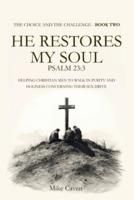© 2010
Let us fix our eyes on Jesus,
the author and perfecter of our faith,
who for the joy set before him endured the cross,
scorning its shame…
* * * * *
In the days of Jesus, if you mentioned the word “crucifixion,” everybody instantly knew exactly what you were talking about. The Jewish historian Josephus referred to the crucifixion of thousands of people by the Romans. We can assume that in a city the size of Jerusalem, it happened several times a year. We know that Jesus spoke often in the Gospels about His death. But did you ever wonder if at certain times He and His disciples might have seen someone dying on a cross? Or maybe the latest news that was going around, “Did you hear, ‘so and so’ was recently crucified?”
Did Jesus fear the cross or its pain? — No!
The scripture above says:
“He endured the cross.”
We know that John the Baptist was beheaded (Mark 6:14-29) and sometime after Jesus was crucified, Stephen was stoned to death. (Acts 7:54-60) Here we see two common forms of execution, but a sword or hanging, were also quick ways of killing someone. Why was crucifixion, “the execution of choice” for the Romans? And why did God, the Triune Godhead, choose this to be the way for Jesus the “Son of God / the Son of Man” to suffer and die?
Concerning the Romans.
We are given just a little information. For them, it was a very effective way to influence any and everyone who saw a crucifixion, to think twice before copying whatever the person dying on the cross had been convicted of doing. And this is also why crucifixions were always made a public event. For anyone crucified was always put on display for all to see. It was a death that was very painful and especially gruesome. The Romans made every effort to inflict as much pain as possible through torture. Accounts reveal that some crucifixions lasted two or three days before the person finally died. That is why, in the Gospel accounts, the two thieves had their legs broken, to hurry their death. (John 19:31-33)
Concerning this, the thinking of the Romans would have been that this was an act of “mercy” on their part. Yet it is likely that they also would have been frustrated in not being able to “finish the torment” they were assigned to do. Once again, their job was to inflict as much misery in every form, and for as long as possible. Another reason the Romans chose this form of execution was that there is not one recorded crucifixion where the accused survived. The cross had a 100% success rate, not even the Son of God survived the cross. Furthermore, we know that crucifixions were so brutal and so horrible that Roman citizens were exempt. Paul the Apostle, a Roman citizen, highlights this about himself (Acts 22:25-29.)
Remember in Hebrews 12:2: it says Jesus:
“scorned its shame,”
Here are some details:
Most often the condemned was stripped naked when crucified. For the Roman’s were no way into modesty. Their job was not only as much torment, pain and suffering as possible, but also to mix it with the maximum amount of shame and humiliation. Let’s not even talk about bladder control for someone on the cross. It is common sense to say that the Roman officers and soldiers were in charge of the crucifixion. In one of the few documented crucifixions, it is stated that the soldiers overseeing several crucifixions at one time entertained themselves by crucifying those condemned in different positions. This is a little insight into how evil they could be. I cannot over emphasize that the Roman soldier’s job was not just to kill the accused, but to brutally torment and shame the individual down to the last second, the last breath of his life. Another fact, according to the information available concerning Roman crucifixions, is that normally,the dead body was left to rot on the cross, or left for wild animals. Jesus —and the two thieves were exceptions because they were crucified on the day before a high feast day and the Jews did not want the bodies visible during their holiday. Therefore, when Jesus was dead, the officer in charge of His crucifixion allowed His body to be buried. (John 19:31-33) Yet the point is that we see even after death the Romans wanted to inflict as much revulsion as possible. Again, the goal of the Romans in using crucifixions was to instill fear and dread to control the people of the country they occupied. This is one reason why some of the disciples had hopes that Jesus might lead a revolt to overthrow the Romans. (Acts 1:6)
The Jews greatly hated the Romans, and to be sure the Romans hated the Jews. Today, both historians and the church have for the most part taken away the horror, the ugliness of the cross. They have removed the shame, the humiliation and replaced it with beautiful pictures of dignity and modesty,decreasing the true darkness, the true evilness of what really happened. The cross as it is presented today has little ugliness and also no power. Also we view the cross today more as an ornament, a decoration, far more so than as an instrument of death. I doubt that crosses were worn around people’s necks back then. Quite the opposite, the cross wore people around its neck till they were dead.
Today the Christian cross has no blood, no sweat, and very little tears and once again — no power.
* * * * *
Now our second question-
Why did our Triune God allow Jesus to die this kind of death?
Mixed into all the events from the Garden of Gethsemane through Jesus’ death on the cross we see that God our Father directed His full wrath against evil and sin.
As Greg Wiley says:
* His “wrath” is His holiness expressed in absolute hatred for evil and sin.
So, not only was Jesus continually physically abused, He faced-facing shame and humiliation every step of the way also. Our heavenly Father wanted all of us to see what His hatred towards sin looks like because we can’t seem to see the true “evilness of all sin.” What needs to be noted here is throughout the “Passion of Christ” the Pharisees and elders readily joined in “all” that was inflicted upon Jesus. The Romans were doing their “job” but what about these “spiritual people?” Today, we are the “spiritual people” and could it be, that every time we knowingly sin, we pretty much have the same heart as those who actually did all this to Jesus? What does our Father want us to take away from what Jesus’ experience throughout His “crucifixion?”
- That Jesus is our “Great Substitute,” and took our place for what we deserve concerning our own sin and,
- He shows us his response to any sin.
Can Jesus relate to any shame in our lives? The answer is a resounding, YES!
This is what we are witnessing with all the events leading up to and including the crucifixion of Jesus. All the wrath of God was poured out on Jesus. The wrath that both you and I deserve, Jesus took for us. How bad was it? The fact is Jesus was unrecognizable on the cross. (Isaiah 52:14)
Yes, He endured the pain, the suffering and the cross. Yet we must include that He also
“scorned its shame.”
That shame was a part of what he went through. Our Father God wants us to see all “three;”
the physical abuse,
the death and
the shame.
In this way, we can appreciate what was planned before the foundation of the world in order to rescue both you and me from sin and death. And as A.B. Simpson said:
It is the cross of Christ which is the object
at once of His shame and His glory.
* * * * *
Dear Lord Jesus,
We stand back in awe and wonder concerning what You went through for each of us. We stand silent before You as we meditate on all of this. We owe you all and want to give You all, but we see even that would not be enough. Yet all that You ask of us is that we love You, as You have loved us.
* * * *
* Greg Wiley, from his book
* * *
* *
*

